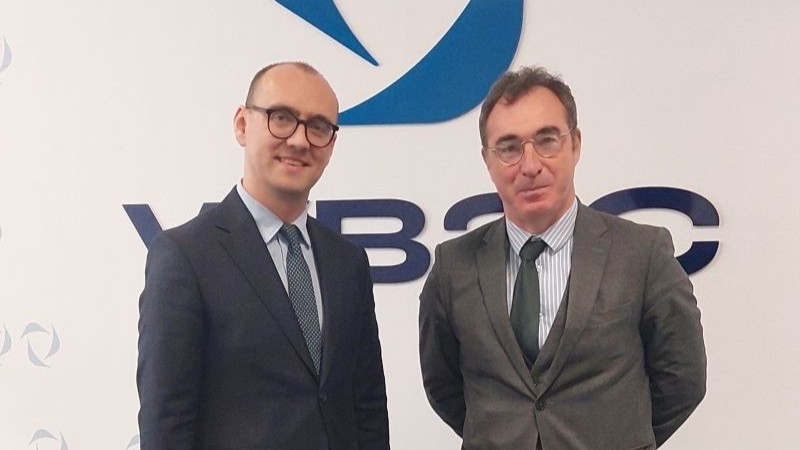WB3C - a powerful symbol of what can be achieved when countries unite to tackle shared challenges
Yesterday marked a significant milestone in the cybersecurity landscape of the Western Balkans with the official inauguration of the Western Balkans Cyber Capacity Centre (WB3C) in Podgorica. The event celebrated a shared commitment of our founding partners to strengthening regional cyber resilience, advancing cooperation and aligning with European standards.
The inauguration was attended by over 100 distinguished guests, including government officials, diplomats, representatives of international organizations and academia. Among the key speakers were the Prime Minister of Montenegro, Mr. Spajić, Deputy Prime Minister and Minister of Foreign Affairs Ervin Ibrahimović, Minister of Public Administration Dukaj, Slovenian Deputy Prime Minister and Minister of Foreign and European Affairs Tanja Fajon, and French Special Envoy for the Western Balkans René Troccaz. Their remarks highlighted the shared belief in the importance of collective action to address evolving cyber threats.
Prime Minister Spajić said: "Our Centre, recognized within the Berlin Process, plays a crucial role in enhancing cybersecurity capacities in the region. With the expertise of France and Slovenia, and the inclusion of all Western Balkan countries, I firmly believe we can significantly advance our regional cybersecurity capabilities."
Minister Ibrahimović emphasized the symbolic and practical value of the Centre: “The WB3C is a unique project with special symbolism—it demonstrates our commitment to creating a secure digital environment and addressing modern challenges. It also reflects the importance of aligning with European standards while fostering regional cooperation, which is critical for our shared future.”
Slovenian Deputy Prime Minister Tanja Fajon highlighted WB3C’s role in fostering unity: “This Centre represents a cornerstone of our efforts to strengthen cooperation within the Western Balkans and build a safer, more secure digital environment for all. By bringing together expertise, resources, and a shared vision, WB3C exemplifies how we can overcome challenges and seize opportunities together.”
French Special Envoy René Troccaz underscored the role of solidarity in building resilience: “Cyber resilience through solidarity is the best way to protect our economies, societies, and institutions from destabilizing threats. WB3C is a testament to the power of collaboration, and I am confident that its work will continue to strengthen the region’s capabilities.”
Minister Dukaj pointed to the practical outcomes of WB3C’s initiatives: “Through its training programs, WB3C ensures that our region is equipped with the knowledge and tools needed to address the rapidly evolving threats in cyberspace. This Centre will not only enhance individual expertise but also foster regional unity and cooperation in the face of shared challenges.”
WB3C’s Director, Yannick Casse expressed his pride in the team and the collaborative spirit driving the Centre’s mission: “With our friends from Slovenia, France, and Montenegro, and the dedicated team here in Podgorica, we are more than a team; we are the Western Balkans Cyber Capacity Centre. Together, we are building a legacy of resilience and innovation.”
A Year of Impact and Ambitious Plans Ahead
Over the past year, WB3C has already demonstrated its value to the region, providing training to over 400 professionals across cybersecurity, cybercrime and cyber diplomacy. These programs are not just about building technical skills—they aim to create connections, foster trust, and prepare the region to face the complex cyber threats of tomorrow.
Looking ahead, WB3C has set ambitious goals for 2025-2027. The Centre plans to train up to 1,500 professionals and is collaborating with the University of Technology of Troyes to establish a university qualification program in Digital Forensics. This program will empower cybercrime investigators to deepen their expertise, ensuring that the region remains at the forefront of addressing modern cybercrime challenges.
Symbolizing a New Phase
The formal unveiling of the WB3C plaque symbolized the beginning of a new chapter in the region’s efforts to strengthen cybersecurity capabilities, deepen cooperation and align with European standards.
By advancing regional resilience and fostering alignment with EU priorities, WB3C plays a pivotal role in supporting the Western Balkans’ integration into the European Union. As the Centre continues its work, it stands as a testament to what can be achieved through commitment, collaboration and a shared vision for a secure digital future.
/Z5J82uGuLV7uinB43ZWZOE6Z4J81TywAyrLrDbgh.jpg)





